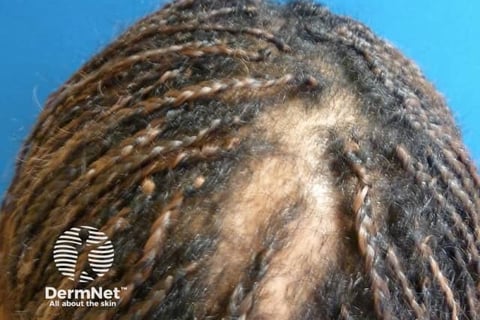

Central Centrifugal Cicatricial Alopecia (CCCA)
When Your Scalp Says, “Hold Up, Y’all!”
Let’s talk about CCCA, a mouthful of a condition that’s common among African-American women. This type of scarring alopecia usually starts right at the crown of your head and slowly spreads outward like ripples in a pond. If your hair is thinning up top and you’re feeling a little lost, don’t worry—you’re not alone, sugar.
What Is CCCA?
Central Centrifugal Cicatricial Alopecia is a scarring condition where the hair follicles get damaged and replaced by scar tissue. Once that happens, those follicles can’t grow hair anymore. It’s sneaky and slow-moving, so it might take a while to notice. The earlier you catch it, the better your chances of stopping it in its tracks.
What Causes It?
We don’t know all the causes just yet, but a few things seem to play a part:
Genetics: If your mama or grandma dealt with it, you might, too.
Hairstyles: Tight braids, sew-ins, and heat styling can add stress to your scalp.
Inflammation: Chronic irritation or scalp conditions might trigger it.
Hormonal Factors: Menopause and other hormonal changes can make it worse.
Signs of CCCA
Thinning or balding at the crown of your head.
Scalp tenderness, burning, or itching.
Inflammation or scarring on the scalp.
Hair breakage near the roots.
What Can You Do About It?
Visit a Trichologist or Dermatologist: Early treatment is key to slowing down the condition.
Anti-Inflammatory Medications: Steroids or other treatments can reduce inflammation.
Gentle Styling: Avoid tight hairstyles, excessive heat, and harsh chemicals.
Scalp Care: Keep your scalp moisturized and clean with mild shampoos.
Nutrition: Eat foods rich in biotin, zinc, and omega-3s to support hair health.
A Little Southern Wisdom
Darlin’, your crown is precious, and you deserve to wear it with pride—whether it’s your natural hair, a protective style, or a fabulous wig. If you’re dealing with CCCA, don’t wait to take action. A little TLC and professional help can go a long way in keeping your scalp happy and healthy.
Get the latest tips and tricks delivered straight to your inbox by subscribing to our monthly newsletter.
COntact US
contact@thefolliclenerd.com
430-808-2014
© 2024. The Follicle Nerd. All rights reserved.
Disclaimer
Alright, y’all, let’s get this out of the way: www.thefolliclenerd.com might earn a little commission if you click on a link and make a purchase. But don’t worry—every review and comparison you’ll find here is as honest as Grandma’s sweet tea recipe. My opinions aren’t for sale, and you can trust that I’m keepin’ it 100.
Now, let’s talk about the fine print. The information on www.thefolliclenerd.com is for informational purposes only. It’s not a replacement for good ol’ professional medical advice. If you’re dealing with a serious scalp situation or any health concerns, call your doctor—not me. And if it’s an emergency, sugar, head straight to the ER. The folks and resources mentioned here aren’t officially endorsed by www.thefolliclenerd.com—you’re using this site and its content at your own risk, so tread carefully.
As a proud distributor of Nature's Sunshine Products, I do earn commissions from the herbal supplements sold here. Oh, and if I review a product? Chances are I got a sample for free—but that doesn’t mean I’m sugarcoating anything. You’ll always get the real tea from me.
Lastly, www.thefolliclenerd.com is offered “as is,” and I can’t be held responsible for any wild claims made by external websites or companies I mention. So, use your best judgment, read the labels, and stay fabulous!
